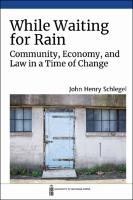While Waiting for Rain
External Review of Whole Manuscript
Community, Economy, and Law in a Time of Change
| dc.contributor.author | Schlegel, John Henry | |
| dc.date.accessioned | 2022-07-28T08:53:49Z | |
| dc.date.available | 2022-07-28T08:53:49Z | |
| dc.date.issued | 2022 | |
| dc.identifier | OCN: 1337924888 | |
| dc.identifier.uri | https://library.oapen.org/handle/20.500.12657/57663 | |
| dc.description.abstract | What might a sensible community choose to do if its economy has fallen apart and becoming a ghost town is not an acceptable option? Unfortunately, answers to this question have long been measured against an implicit standard: the postwar economy of the 1950s. After showing why that economy provides an implausible standard—made possible by the lack of economic competition from the European and Asian countries, winners or losers, touched by the war—John Henry Schlegel attempts to answer the question of what to do. While Waiting for Rain first examines the economic history of the United States as well as that of Buffalo, New York: an appropriate stand-in for any city that may have seen its economy start to fall apart in the 1960s, 70s, and 80s. It makes clear that neither Buffalo nor the United States as a whole has had an economy in the sense of “a persistent market structure that is the fusion of an understanding of economic life with the patterns of behavior within the economic, political, and social institutions that enact that understanding” since both economies collapsed. Next, this book builds a plausible theory of how economic growth might take place by examining the work of the famous urbanist, Jane Jacobs, especially her book Cities and the Wealth of Nations. Her work, like that of many others, emphasizes the importance of innovation for economic growth, but is singular in its insistence that such innovation has to come from local resources. It can neither be bought nor given, even by well-intentioned political actors. As a result Americans generally, as well as locally, are like farmers in the midst of a drought, left to review their resources and wait. Finally, it returns to both the local Buffalo and the national economies to consider what these political units might plausibly do while waiting for an economy to emerge. | en_US |
| dc.language | English | en_US |
| dc.subject.classification | thema EDItEUR::N History and Archaeology::NH History | en_US |
| dc.subject.classification | thema EDItEUR::N History and Archaeology::NH History::NHK History of the Americas | en_US |
| dc.subject.classification | thema EDItEUR::K Economics, Finance, Business and Management::KC Economics::KCZ Economic history | en_US |
| dc.subject.classification | thema EDItEUR::R Earth Sciences, Geography, Environment, Planning::RP Regional and area planning::RPC Urban and municipal planning and policy | en_US |
| dc.subject.other | Buffalo, Community, Development, Economic History, Economy, Grace, Innovation, Jane Jacobs, Law, Legal History, Middle Classes, Political Economy, Railroads, Redevelopment, the Rust Belt, Transportation, The United States, Working Class, Ethnic Neighborhoods, The Fifties | en_US |
| dc.title | While Waiting for Rain | en_US |
| dc.title.alternative | Community, Economy, and Law in a Time of Change | en_US |
| dc.type | book | |
| oapen.identifier.doi | 10.3998/mpub.12158309 | en_US |
| oapen.relation.isPublishedBy | e07ce9b5-7a46-4096-8f0c-bc1920e3d889 | en_US |
| oapen.relation.isFundedBy | 0cdc3d7c-5c59-49ed-9dba-ad641acd8fd1 | en_US |
| oapen.relation.isbn | 9780472075614 | en_US |
| oapen.relation.isbn | 9780472055616 | en_US |
| oapen.collection | Sustainable History Monograph Pilot (SHMP) | en_US |
| oapen.collection | Sustainable History Monograph Pilot (SHMP) | en_US |
| oapen.pages | 408 | en_US |
| peerreview.anonymity | Double-anonymised | |
| peerreview.id | d98bf225-990a-4ac4-acf4-fd7bf0dfb00c | |
| peerreview.open.review | No | |
| peerreview.publish.responsibility | Scientific or Editorial Board | |
| peerreview.review.decision | Yes | |
| peerreview.review.stage | Pre-publication | |
| peerreview.review.type | Full text | |
| peerreview.reviewer.type | External peer reviewer | |
| peerreview.title | External Review of Whole Manuscript | |
| oapen.review.comments | The proposal was selected by the acquisitions editor who invited a full manuscript. The full manuscript was reviewed by two external readers using a double-blind process. Based on the acquisitions editor recommendation, the external reviews, and their own analysis, the Executive Committee (Editorial Board) of U-M Press approved the project for publication. |

